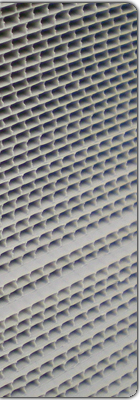| |
|
 |
|
| What is Polypropylene? |
| |
What is it? Polypropylene, PP, first produced commercially in 1958, is the younger brother of polyethylene - a very similar molecule with similar price, processing methods and application. Like PE it is preduced in very large quantities (more than 30 million tons per year in 2000), growing at nearly 10% per year, and like PE its molecule-lengths and side-branches can be tailored by clever catalysis, giving precise control of impact strength, and of the properties that influence moulding and drawing. In its pure form polypropylene is flammable and degrades in sunlight. Fire retardants make it slow to burn and stabilisers give it extreme stability, both to UV radiation and to fresh and salt water and most aqueous solutions.
Design Notes Standard grade PP is inexpensive, light and ductile but it has low strength. It is more rigid than PE and can be used at higher temperatures. The properties of PP are similar to those of HDPE but it is stiffer and melts at higher temperature (165 - 170 C). Stiffness and strength can be improved by reinforcing with glass, chalk or talc. When drawn to fibre PP has exceptional strength and resilience; this, together with its resistance to water, makes it attractive for ropes and fabric. It is more easily moulded than PE, has good transparency and can accept a wider, more vivid range of colours. Advances in catalysis promise new co-polymers of PP with more attractive combinations of toughness, stability and ease of processing. Mono-filaments fibres and multi-filament yarn or rope have hight abrastion resistance and are almost twice as strong as PE fibres.
The Environment PP is exceptionally inert and easy to recycle, and can be incinerated to recover the energy it contains. PP, like PE and PVC, is made by processes that are relatively energy efficient, making them the least energy-intensive of commodity polymers. Its utility per kilogram far exceed that of gasoline or fuel-oil, so that production from oil will not disadvantage it in the near future. |
|
|

